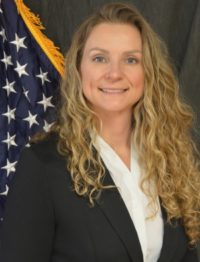CHILLICOTHE, OH — Any interaction with the criminal justice system can be a frightening, confusing experience for those being charged. It can be especially difficult to navigate for men and women who are homeless or struggling with mental health or substance abuse issues. Many are socially isolated, having exhausted the support of their family and friends. Without assistance upon release—someone to help them find housing or get treatment—the chances are high that they will end up in a courtroom again in the future. The result is a self-perpetuating cycle of incarceration.
This can be frustrating to witness, especially when it comes to veterans. For them, at least, there are dedicated programs at VA facilities and community organizations designed to help with the very issues that led them to be incarcerated in the first place.
Tisha Hardin, a Veterans Justice Outreach (VJO) Specialist at the Chillicothe VA Medical Center, is one of the people trying to get veterans into those programs before that cycle of infraction and incarceration scoops them back up again.
“I initially started my work in the community as a substance abuse counselor,” Hardin explained. “I’m from a small Appalachian town that was kind of ground zero to the opioid epidemic. I saw my community get devastated, and I went into addiction work for the first 10 years of my career.”
Eventually Hardin began working toward a master’s degree, during which time she was placed at VA. “I discovered that VA was a place where I can help people with trauma and grow professionally,” she said.
“[At VJO,] we’re seeing people with multiple [issues],” Hardin explained. “The veterans I’m serving are really impacted by pretty significant issues—homelessness, addiction. And a lot of vets [are] severely mentally ill. When you look at those disorders or diagnoses in general, you see a lot of relapse.”
To prevent that relapse, the VJO focuses on three areas: courts and attorneys, law enforcement and jails. Hardin has developed relationships in each of those systems.
Attorneys, judges and probation officers across the 17-plus counties that Hardin services know, if they identify a defendant as a veteran who could benefit from VA’s services, to refer them to VJO. Hardin has the same relationship with jail administrators and jail nurses.
For veterans who have never entered the VA system—and this is many of them—Hardin begins a 10-10EZ application for VA healthcare. She also refers many of them to VA’s homeless programs.
She helps refer veterans to Veterans Treatment Courts and set up courts in communities where none exist, as well as arrange for veteran-specific probation officers.
“[These officers] can remember that these are people with specific issues and should go to VA,” Hardin explained.
The VJO also plays a role in educating police officers about veterans and their needs.
“I do crisis intervention training with police officers,” Hardin said. “I show a video of a veteran responding in a combat situation, [then] how them transitioning back into their life and how that may look for them and the difficulties they may be experiencing as a result of that transition.”
The goal is for police officers to see not just a person breaking the law but a veteran who is having difficulty transitioning back into civilian life and to interact with them accordingly.
Over the past decade, Hardin has seen a positive shift in how attorneys and judges view mental health and substance abuse treatment.
“Judges now—their expectation is for everyone to get treatment,” Hardin explained. “It’s part of the natural process. So judges are wanting to use these resources.”
The biggest difficulty for Hardin is in the identification of veterans in the criminal justice system in the first place.
“Veterans underreport their veteran status during the legal process because of the stigma around incarceration and legal issues,” Hardin explained. “That’s not a time when you want to stand up and say I served my country.”
As a result, men and women enter the prison system without being identified as veterans.
Recently Hardin discovered just how big that disparity can be. Inspired by a program in Indiana, she developed a pilot project partnering with a software company to run the names of all of the inmates in one county and cross-reference them with records of military service.
The result was the identification of 463 veterans that were in the justice system in that county that the VJO was unaware of.
“Previously, I would have seen maybe eight veterans in that county that year,” Hardin declared.
Until that kind of automation is standard, with cross-referencing done as a matter of course, Hardin has to rely on that veteran speaking up, or someone emailing her or picking up the phone to tell her that there is a veteran in the prison system that could use VA’s help.
“Most vets are really being missed,” she said. “It’s a missed opportunity.”
While VJO can assist veterans with a wide range of issues, it’s those that need serious mental healthcare where VA really shines.
“With Ohio’s Medicaid expansion, there’s a lot of drug and alcohol services. And the courts are really comfortable referring veterans to those agencies. But one thing the VA has a corner one is mental health residential treatment,” Hardin explained. “Our ability to place veterans in acute psychiatric and residential mental health treatment—you can’t find those beds in the community. We really need continued education on our [resources] and on our ability to treat veterans with severe mental illness.”
Information on the full range of VJO’s services and how to contact a specialist can be found at: https://www.va.gov/HOMELESS/VJO.asp


